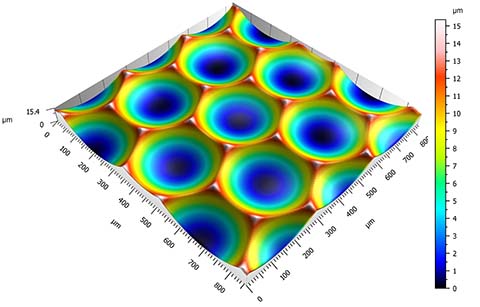Growth areas such as LiDAR, Time of Flight and 3D sensing are supported by advanced optical components including surface relief flat optics that provide customized intensity profiles and beam shapes. Advances have been made in this area with Light Shaping MicroOptics (LSMs), an in-house direct-beam laser writing platform that uses greyscale laser photolithography. This is a single-step, maskless writing process that enables the creation or mastering of refractive and diffractive optics with small feature sizes. Thin film or rigid optical components can be manufactured by injection molding, roll-to-roll embossing, or sheet-by-sheet embossing, depending on thickness, substrate, temperature and volume requirements.
Light Shaping Beyond Gaussian
While most diffusers create Gaussian profiles, there are certain applications where other intensity profiles are necessary. Flat-top, batwing, random dots, and structured light are more ideal for 3D sensing and LiDAR where the intensity profile and shape need to be customized to improve the efficiency of the system. The current methods of fabricating surface relief flat optics include holographic, E-beam, diamond turned and grayscale lithography. Each of these methods has advantages that depend on the application or industry.
Luminit Light Shaping Diffusers (LSDs) use surface relief micro-structures that rely on simple optical refraction to increase the divergence angle of the source. The precise beam angle control and uniformity of this type of diffuser is useful for the LED industry where the ability to manipulate the Full Width Half Maximum (FWHM) of the light and improve the homogeneity of the projected beam allows OEMs flexibility without sacrificing the efficiency of a system. However, because a holographic diffuser produces a Gaussian intensity profile, it is not necessarily suitable for applications that require square or rectangular beam shapes that match the requirements of the detection path of a system, such as 3D sensing and LiDAR. These applications require custom microoptics.
For example, in 3D sensing applications, the illumination plane (a flat field) needs to be uniformly illuminated with sharp drop offs on the edge. A Gaussian intensity profile has higher intensity in the center of the profile with gradual drop offs on the edge. With custom microoptics, however, an array of custom micro lenses is created with grayscale lithography one lens at a time. Advantages include features sizes down to one micron, higher resolution and a more uniform output across the field of illumination.

False color map of micro lens array
Although LSM can control the intensity profile with similar performance as Light Shaping Diffusers, it does not replace this technology because a fair amount of customization is required and there are size limitations. However, Light Shaping Microoptics uses a maskless process so level write times are much faster than a multi-level writing process, and we can produce 200mm x 200mm size parts. For larger sizes and mass production, the master can be used to make a larger part using an in-house technique of tiling the original master.
In the automotive exterior lighting market, large diamond-turned structures are used to control the light output, which allows OEMs to meet strict regulations set forth by the National Highway and Traffic Safety Administration (NHTSA). The downside is the lens arrays are large (0.5mm) and cosmetically unappealing due to the pixelated look they provide. Light Shaping MicroOptics can make the same lens shape and shrink the size of the features. This works because a lens does not have to be 0.5mm to be refractive with a white source. Depending on the lens function, the size can be as small as 10 microns, which is invisible to the eye, making the appearance smoother and homogenous without losing the lens function.
While Light Shaping MicroOptics may not apply to every application, this technology is an upgrade to the flat optic portfolio, and custom micro optics will continue to broaden optical capabilities in a variety of high-tech industries.
For more information, contact sales@luminitco.com.
